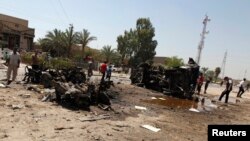Iraq is blaming al-Qaida for a series of car bombs that ripped across the Iraqi capital, killing at least 33 people and wounding dozens more.
The deadliest blast Thursday hit the Kadhimiyah neighborhood in northern Baghdad, killing at least seven people.
There was no immediate claim of responsibility for the attacks but a statement from Iraq's interior ministry blamed al-Qaida militants "motivated by hatred and religious edicts." The statement also said "Iraq's streets have become a battleground."
Thursday's attacks came just as Iraqi Foreign Minister Hoshyar Zebari prepared to meet with U.S. Secretary of State John Kerry in Washington.
During a joint appearance with the media, Kerry said both countries would work together to combat the terrorists in Iraq and elsewhere.
"This al-Qaida network, we know, stretches well beyond Iraq's borders," he said. "With many al-Qaida leaders now operating in Syria we all need to accelerate our work in order to set the conditions for a diplomatic settlement to the Syrian crisis."
Thursday's attacks in the Iraqi capital follow a pair of bombings Wednesday in Baquba, north of Baghdad, that killed 14 people.
Iraq's Prime Minister Nouri al-Maliki vowed on Wednesday to continue confronting terrorism, and said 800 suspects have been arrested in a security crackdown.
Iraq has seen a surge in terrorism and violence this year amid tension between the country's Sunni minorities and the Shi'ite-led government. More than 3,000 people have been killed.
On Monday, the al-Qaida-linked Islamic State of Iraq and the Levant claimed responsibility for a series of deadly bombings last week and threatened more violence.
.
The deadliest blast Thursday hit the Kadhimiyah neighborhood in northern Baghdad, killing at least seven people.
There was no immediate claim of responsibility for the attacks but a statement from Iraq's interior ministry blamed al-Qaida militants "motivated by hatred and religious edicts." The statement also said "Iraq's streets have become a battleground."
Thursday's attacks came just as Iraqi Foreign Minister Hoshyar Zebari prepared to meet with U.S. Secretary of State John Kerry in Washington.
During a joint appearance with the media, Kerry said both countries would work together to combat the terrorists in Iraq and elsewhere.
"This al-Qaida network, we know, stretches well beyond Iraq's borders," he said. "With many al-Qaida leaders now operating in Syria we all need to accelerate our work in order to set the conditions for a diplomatic settlement to the Syrian crisis."
Thursday's attacks in the Iraqi capital follow a pair of bombings Wednesday in Baquba, north of Baghdad, that killed 14 people.
Iraq's Prime Minister Nouri al-Maliki vowed on Wednesday to continue confronting terrorism, and said 800 suspects have been arrested in a security crackdown.
Iraq has seen a surge in terrorism and violence this year amid tension between the country's Sunni minorities and the Shi'ite-led government. More than 3,000 people have been killed.
On Monday, the al-Qaida-linked Islamic State of Iraq and the Levant claimed responsibility for a series of deadly bombings last week and threatened more violence.
.






